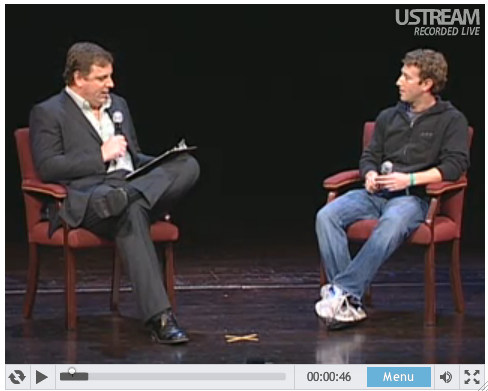Home | Solutions Blog | Facebook
Posts tagged "Facebook"
Young job-seekers are hiding their Facebook pages.
In today’s economic climate, more and more individuals are searching for jobs. Many job-seekers are just beginning to realize that managers looking to hire them can easily Google their name to find Facebook profiles, tweet history and vast quantities of online information that they would probably rather keep a bit more private. This is even more prevalent with recent college graduates who are entering the job market for the first time. With tough competition from so many qualified candidates, employers are turning to Facebook to help them sift through resumes. While some profiles are innocent, many have pictures, posts, and more that could possibly disqualify them from getting a job before they even walk into the interview. A new article by CNN discusses how more and more job-seekers are choosing to hide their Facebook profiles by changing their names (assuming an Alias, in spy terms) in order to keep a clean digital image of themselves on the web.
Posted in Identity Theft Prevention, Online Privacy by Identity Theft Speaker John Sileo.
Tags: Facebook, Facebook Expert, facebook privacy, John Sileo, Privacy, Privacy Facebook, safety, social networking, Social Networking Speaker
 The New York Times recently published an article that discusses the severe changes Facebook has made to privacy settings. This is the last post on these changes and each post gives you details on how to manage these new settings so that you can gradually accumulate your Facebook Privacy.
The New York Times recently published an article that discusses the severe changes Facebook has made to privacy settings. This is the last post on these changes and each post gives you details on how to manage these new settings so that you can gradually accumulate your Facebook Privacy.
What Can Google See? (Keep Your Data Off the Search Engines)
When you visit Facebook’s Search Settings page, a warning message pops up. Apparently, Facebook wants to clear the air about what info is being indexed by Google. The message reads:
There have been misleading rumors recently about Facebook indexing all your information on Google. This is not true. Facebook created public search listings in 2007 to enable people to search for your name and see a link to your Facebook profile. They will still only see a basic set of information.
Posted in Identity Theft Prevention, Online Privacy by Identity Theft Speaker John Sileo.
Tags: Facebook, Facebook Expert, facebook privacy, Google, John Sileo, Privacy, Privacy Facebook, safety, social networking
 The New York Times recently published an article that discusses the severe changes Facebook has made to privacy settings. This is the second post on these changes and each post will give you details on how to manage these new settings so that you can gradually accumulate your Facebook Privacy.
The New York Times recently published an article that discusses the severe changes Facebook has made to privacy settings. This is the second post on these changes and each post will give you details on how to manage these new settings so that you can gradually accumulate your Facebook Privacy.
Who Can See Your Personal Info?
Facebook has a section of your profile called “personal info,” but it only includes your interests, activities, and favorites. Other arguably more personal information is not encompassed by the “personal info” setting on Facebook’s Privacy Settings page. That other information includes things like your birthday, your religious and political views, and your relationship status.
After last month’s privacy changes, Facebook set the new defaults for this other information to viewable by either “Everyone” (for family and relationships, aka relationship status) or to “Friends of Friends” (birthday, religious and political views). Depending on your own preferences, you can update each of these fields as you see fit. However, we would bet that many will want to set these to “Only Friends” as well. To do so:
Posted in Identity Theft Prevention, Online Privacy by Identity Theft Speaker John Sileo.
Tags: Facebook, Facebook Expert, facebook privacy, John Sileo, Privacy, Privacy Facebook, safety, social networking
 The New York Times recently published an article that discusses the severe changes Facebook has made to privacy settings. Each post will give you details on how to manage these new settings and I will break these three topics up so that you can gradually accumulate your Facebook Privacy.
The New York Times recently published an article that discusses the severe changes Facebook has made to privacy settings. Each post will give you details on how to manage these new settings and I will break these three topics up so that you can gradually accumulate your Facebook Privacy.
Who Can See The Things You Share? (Status Updates, Photo, Videos, etc.)
Probably the most critical of the privacy changes was the change made to status updates. Although there’s now a button beneath the status update field that lets you select who can view any particular update, the new Facebook default for this setting is “Everyone.” And by everyone, they mean everyone.
If you accepted the new recommended settings then you voluntarily gave Facebook the right to share the information about the items you post with any user or application on the site. Depending on your search settings, you may have also given Facebook the right to share that information with search engines, too.
Posted in Identity Theft Prevention, Online Privacy by Identity Theft Speaker John Sileo.
Tags: Facebook, Facebook Expert, facebook privacy, John Sileo, Privacy, Privacy Facebook, safety, social networking
Understand the new Facebook homepage and know your settings.
The new layout of Facebook’s homepage had some major navigational and privacy setting changes. You may find it harder to find a link that used to be there or find new features that you haven’t seen, but there are some key components to the new Facebook Homepage. As Facebook illustrates in their new homepage tour, there are 6 core components of the new home page: requests and notifications, news feed, bookmarked applications, online friends, account privacy and settings, birthday and event reminders, and Facebook chat.

Take 5 minutes to view the facebook homepage tour and review your privacy settings. While these three settings are very critical, they’re by no means the only privacy settings worth a look. You may think these sorts of items aren’t worth your time now, the next time you lose out on a job because the hiring manager found some inappropriate pictures or saw something inappropriate a friend posted on your wall, you may have second thoughts. But why wait until after a storm to buy an umbrella?
Posted in Identity Theft Prevention, Online Privacy by Identity Theft Speaker John Sileo.
Tags: Facebook, Facebook Expert, facebook privacy, John Sileo, Privacy, Privacy Facebook, safety, social networking

Mark Zuckerberg, CEO of Facebook, was interviewed just last week by Mike Arrington, co-founder of TechCrunch. They discussed privacy and how Facebook is looking to move forward in the future. Zuckerberg made some really interesting comments on Facebook, but I think the most prevalent to Identity Theft would be what he said on the progression of information sharing.
“People have really gotten comfortable, not only sharing more information and different kinds, but more openly and with more people.”
Zuckerberg also said that when Facebook began most people thought: why would I put any information on the internet at all? Now most users don’t think twice about privacy before making posts. Due to the Privacy changes Facebook made in December, your name, profile picture, gender, current city, networks, Friends List, and all the pages you subscribe to are now publicly available information on Facebook. Many people feel that this is a contradiction to what Zuckerberg had said before — that Facebook privacy controls are “the vector around which Facebook operates.” With more than 350 million users on Facebook, privacy is more important than ever.
Posted in Identity Theft Prevention, Online Privacy by Identity Theft Speaker John Sileo.
Tags: Facebook, facebook privacy, facebook privacy expert, John Sileo, Mark Zuckerberg, social engineering expert, social networking
If it seems too good to be true, it probably is. 
That is the best way to Think Like A Spy and be alert of Social Engineers that are trying to manipulate you. With such a gloomy economy and many people without work, offers for fast cash and huge discounts become more and more attractive. Most of these Identity Theft cases use the technique of Social Engineering.
Social Engineering is the act of manipulating people into performing actions or divulging confidential information by playing on their human emotions. The term typically applies to deception for the purpose of information gathering, fraud, or computer system access; in most cases the attacker never comes face-to-face with the victim. These days most thieves can nab your identity over the phone, mail, email, and through social networking sites such as Facebook and Twitter.
Posted in Fraud Detection & Prevention, Identity Theft Prevention, Online Privacy by Identity Theft Speaker John Sileo.
Tags: Facebook, Human Emotions, identity theft expert, Identity Theft Prevention, John Sileo, Online/Social Media Privacy, social engineering, Think Like A Spy, twitter
 Tareq and Michaele Salahi — Washington socialites are not just known for their possible roles in the upcoming “The Real Housewives of Washington,” but for being seen arriving at the White House State Dinner. The problem was that they weren’t on the guest list, but managed to work their way inside what is supposed to be the most secure party.
Tareq and Michaele Salahi — Washington socialites are not just known for their possible roles in the upcoming “The Real Housewives of Washington,” but for being seen arriving at the White House State Dinner. The problem was that they weren’t on the guest list, but managed to work their way inside what is supposed to be the most secure party.
The couple took to Facebook to document their party-crashing, and on Wednesday, Michaele Salahi’s Facebook page included photos of the couple at the dinner. The Salahis weren’t exposed until journalists caught sight of pictures showing the Salahis posing with President Barack Obama, Vice President Joe Biden and others. In the aftermath, the security breach looked more like a publicity stunt than a security threat. The Secret Service admitted that they did not verify at each checkpoint that this couple was on the invitation list. In other words, they missed the second cardinal rule of security, Verify.
Posted in Online Privacy by Identity Theft Speaker John Sileo.
Tags: Facebook, identity theft expert, Identity Theft Speaker, John Sileo, Online/Social Media Privacy, social engineering, social networking, White House, White House Party Crashers
 During a time when rules, laws and privacy settings are having trouble keeping up with technology, Facebook is having trouble keeping up with their ever growing population. Recently topping 350 million users, Facebook is scrambling to satisfy them all. Recently, Mark Zuckerberg, the CEO of Facebook, posted an open letter on the website discussing changes to the Facebook privacy setting that they are implementing to help make their users data less public. Take a minute to read the full article and protect your profile.
During a time when rules, laws and privacy settings are having trouble keeping up with technology, Facebook is having trouble keeping up with their ever growing population. Recently topping 350 million users, Facebook is scrambling to satisfy them all. Recently, Mark Zuckerberg, the CEO of Facebook, posted an open letter on the website discussing changes to the Facebook privacy setting that they are implementing to help make their users data less public. Take a minute to read the full article and protect your profile.
Order your copy of the Facebook Safety Survival Guide to make sure you and your children are protected online.
John Sileo became America’s leading Identity Theft Speaker & Expert after he lost his business and more than $300,000 to identity theft and data breach. His clients include the Department of Defense, Pfizer and the FDIC. To learn more about having him speak at your next meeting or conference, contact him by email or on 800.258.8076.
Posted in Identity Theft Prevention, Online Privacy by Identity Theft Speaker John Sileo.
Tags: Facebook, identity theft expert, Identity Theft Prevention, John Sileo, Mark Zuckerberg, Online/Social Media Privacy, Privacy Settings, social networking

 The New York Times recently published an article that discusses the severe changes Facebook has made to privacy settings. This is the last post on these changes and each post gives you details on how to manage these new settings so that you can gradually accumulate your Facebook Privacy.
The New York Times recently published an article that discusses the severe changes Facebook has made to privacy settings. This is the last post on these changes and each post gives you details on how to manage these new settings so that you can gradually accumulate your Facebook Privacy.


 Tareq and Michaele Salahi — Washington socialites are not just known for their possible roles in the upcoming “The Real Housewives of Washington,” but for being seen arriving at the White House State Dinner. The problem was that they weren’t on the guest list, but managed to work their way inside what is supposed to be the
Tareq and Michaele Salahi — Washington socialites are not just known for their possible roles in the upcoming “The Real Housewives of Washington,” but for being seen arriving at the White House State Dinner. The problem was that they weren’t on the guest list, but managed to work their way inside what is supposed to be the  During a time when rules, laws and privacy settings are having trouble keeping up with technology, Facebook is having trouble keeping up with their ever growing population. Recently topping 350 million users, Facebook is scrambling to satisfy them all. Recently, Mark Zuckerberg, the CEO of Facebook, posted an open letter on the website discussing changes to the
During a time when rules, laws and privacy settings are having trouble keeping up with technology, Facebook is having trouble keeping up with their ever growing population. Recently topping 350 million users, Facebook is scrambling to satisfy them all. Recently, Mark Zuckerberg, the CEO of Facebook, posted an open letter on the website discussing changes to the 







